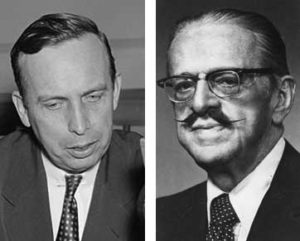 Springfield. That’s shorthand for Springfield, Missouri, home of the U.S. Medical Center for Federal Prisoners. It opened in 1933 as the U.S. Hospital for Defective Delinquents and quickly became the primary medical center for the entire federal prison system. It’s where prisoners with all kinds of medical problems, including those deemed to be mentally ill, were (and are, still) sent for longer-term treatment and convalescence.
Springfield. That’s shorthand for Springfield, Missouri, home of the U.S. Medical Center for Federal Prisoners. It opened in 1933 as the U.S. Hospital for Defective Delinquents and quickly became the primary medical center for the entire federal prison system. It’s where prisoners with all kinds of medical problems, including those deemed to be mentally ill, were (and are, still) sent for longer-term treatment and convalescence.
During the national sex crime panic of the Forties and Fifties, an aroused public demanded that authorities round up “sex perverts” and lock them away. City names became stand-ins for places to send these crazy people. “Send them to Lima,” they’d say in Ohio. Or, “Send them to Big Spring,” in Texas. Whether anyone actually benefitted from being sent to wherever they were sent — that was a different question entirely and few bothered to ask. The important thing was that they weren’t here anymore. They were safely locked away at Ionia or Mount Pleasant or Chattahoochee.
Or Springfield.
On January 13, 1950, the U.S. House Appropriations Subcommittee for the Departments of State, Justice, Commerce and the Federal Judiciary was going over the Justice Department’s proposed budget for 1951. That morning, they examined budgets for the Anti-Trust Division, States Attorneys, U.S. Marshals, the FBI, Immigration and Naturalization — all before lunch.
When the subcommittee resumed its session at two o’clock that afternoon, it turned to the proposed budget for the Federal Prison System. Director James V. Bennett, a well-known penal reformer, defended the proposed $2.14 million increase ($23 million today) over the previous year’s budget. About midway through Bennett’s testimony, Rep. Daniel J. Flood (D-PA), grilled Bennett over the Federal Prison System’s handling of so-called “sexual psychopaths,” which, in Flood’s mind, mainly meant homosexuals. Flood posed a hypothetical situation: say there are ten check forgers. Nine are normal, but the tenth says he’s a homosexual. The nine are put on probation, but obviously not the tenth. He’s sent to Springfield. Why? Well, it’s obvious, isn’t it? He’s a homosexual.
Flood’s example illustrates how completely interchangeable the terms “sexual psychopath” and “homosexual” really were. The homosexual man before the judge wasn’t accused of a sex offense. He didn’t even admit to having had any particular sexual relations, let alone violent or non-consensual ones. All he did, in Flood’s example, was simply say, “I’m a homo.” And that alone, in Flood’s mind, gave the judge no other choice but to send him to Springfield.
Now, in reality, the law didn’t work that way. There were procedures in place that had to be followed before anyone could be sent away anywhere. In some jurisdictions, the procedures were very strict. But in others, it was largely left to the discretion of the judge. But not even in the loosey-goosiest jurisdiction would a forged check be a triggering offense that would endanger someone to be sent away to a psychiatric hospital. So right away, Flood’s hypothetical setup had little bearing on what could actually happen to a gay man standing before a Federal judge. But it does show what Flood thought should happen. And if anyone else in the room thought differently, they kept their peace.
And besides, that wasn’t the point of Flood’s question. What he was really trying to find out was whether the money being shipped off to Springfield was doing anybody any good.
Director Bennett’s reply that should have horrified everyone in the room. But of course, it didn’t, not any more than Flood’s hypothetical that started it all. Bennett acknowledged, more or less, that they really had no idea what they were doing. But he did suggest that having all of those these homosexuals in one place would make a good supply of subjects for medical experiments. In fact, they already conducted one experiment. It involved injecting hormones into homosexual men.
Here is the entire exchange:

Rep. Flood: Here is a refinement of the question I asked you last year. You may not remember, so we will put it altogether in one. There is a male prisoner arrested for forging a Government check. First offense; fine family, good record; comes before the judge, takes a plea. Ordinarily he would be given a suspended sentence and place on a year’s probation.
Dir. Bennett: I would think that would be likely.
Rep. Flood: Probably that would follow in 9 cases out of 10. This is the tenth case. In the course of the presentence investigation, it is developed he is a homosexual; he admits it, and there is no question about it. The judge says, “Are you?” He says, “Yes.”
It is a crime. The judge cannot give him a year on probation. The fellow is a criminal in something else. So he sends him to you and you recommend Springfield, Mo., for a year.
What are you going to do with him in Springfield, or anyplace else? He is sentenced, not for the crime to which he plead, for which he would ordinarily get a suspended sentence, but your pretrial people, presentence people, find out the fellow is a “homo.” He said he was. There is no debate about it and there is the judge and he does not know what to do, so he gives him a year, and he wonders what he will do with him. You say, “Send him to Springfield.” So he is there. What happens to him a Springfield?
Dir. Bennett: Let me, first of all, Mr. Congressman, point out that many people are in Federal court technically for one thing, for income-tax violation, say like Mr. Al Capone, but is given a 10-year sentence, not because of the flagrancy of the income-tax violation, but because he is a gangster.
Rep. Flood: That is not my case. They wanted to send Capone to jail. But they cannot do anything out it in this case. He tells them something which makes it mandatory. In other words, the judge cannot turn him loose.
Dir. Bennett: What do we do about the sex psychopath; Mr. Congressman, is that what you mean?
Rep. Flood: That is the next question that I am going to ask you. You have two psychiatrists going into Springfield, Mo., and I certainly think you need four down there.
Dir. Bennett: We need more.
Rep. Flood: What are you doing? Do you have an institution — do you consider Springfield, Mo., your special institution for homosexuals, or sexual psychopaths?
Dir. Bennett: We have been sending a considerable number of confirmed sexual psychopaths to Springfield.
Rep. Flood: Nothing is happening. It is a bad job. They are not being treated properly. Nothing is coming out. There is not much difference there than anyplace else. What are you going to do about sexual psychopaths in Federal prisons? You have a lot of them, do you not?
Dir. Bennett: Yes, sir.
Rep. Flood: Are you doing anything?
Dir. Bennett: Yes, sir. Everything possible is being done. We have been treating them by psychiatric methods to the limit of our ability.
Rep. Flood: Do you think you are curing them?
Dir. Bennett: Some of them we are helping.
Rep. Flood: So at the end of the year he is right where he was, a sexual psychopath. That is not your fault, is it?
Dir. Bennett: There isn’t much more known, Mr. Congressman, about how to treat and improve the sexual psychopath than there is how to treat cancer.
Rep. Flood: Now we are getting some place.
Dir. Bennett: We do know that in a few cases, by psychoanalytical methods, we can sometimes get to the root of an individual person’s case and troubles, but as you well know, that is an extra-ordinarily expensive method, and it takes a long time for the psychiatrist to get to the root of the evil.
Rep. Flood: Let me ask you, are you doing everything under the circumstances of medial and penological theories that can be done with sexual psychopaths in view of the money you are getting?
Dir. Bennett: No, we are not doing everything we can do, because we don’t have the personnel.
Rep. Flood: Why not?
Dir. Bennett: We simply don’t have the funds for it.
Rep. Flood: That is why I asked you. Out of the money you are getting then.
Dir. Bennett: We are doing everything we can with the funds we are getting.
Rep. Flood: You are not doing very much?
Dir. Bennett: We are not doing as much as we would like, no sir; but we are doing more than any other correctional system, or anybody else.
Rep. Flood: Are you segregating in Springfield your sexual psychopaths in the institution?
Dir. Bennett: Within the institution?
Rep. Flood: Are you segregating them within the institution?
Dir. Bennett: Yes sir. We have a special building and special psychiatrists assigned to them. Let me tell you one of the things we tried out there.
We thought that injection of hormones into the so-called passive homosexual would be helpful. We tried that, and spent quite a lot of time and effort on the matter. Some helpful results were obtained in some cases, but in other cases where the cause of sexual psychopathy was entirely mental, had no physical base, why it wasn’t very helpful. We think, Mr. Congressman, and I have recommended on several occasions, that some money be given to us for research in this problem of sex psychopathy. We have a large laboratory. We have more cases of people of that kind in our institutions than in any other one place. We could utilize these opportunities for research purposes, and this advance the knowledge of this extremely difficult affliction.
We have had, out of the Army, a large number of men who were committed to our institutions for rape, for sodomy, and other sex offenses. We have not been able to organize a research program because we have not had psychiatric assistance. There is no use, gentlemen, of talking about trying to stop abnormal sex crimes through punitive methods. It is basically a disease and we might as well recognize it as a disease, and see if we can’t find a cure.
Rep. Flood: Is it hereditary or acquired?
Dir. Bennett: I don’t know. Sometimes, at least, a person seems to be born that way.
Rep. Flood: Both?
Dir. Bennett: Yes. There are certain well-known types of so-called hermaphrodites, and some others are born that way, but the number is relatively small.
Rep. Flood: You seem to be very unhappy about the whole thing.
Dir. Bennett: I’m very unhappy about the amount of research that is being done in the field of sex psychopathy.
Rep. Flood: It is a major criminological problem in the Federal penal institutions today?
Dir. Bennett: I can think of nothing where we could make a greater contribution to law enforcement than trying to find the basis of this mental and physical affliction. Yes, it is a major problem.
Rep. Flood: That is all.
Dir. Bennett: I will, if you will permit me, Mr. Flood, send you a copy of my annual report, in which I go into the question of the sex psychopath, the number of them, and the problems they rpesent and what I think is a constructive program for their improvement.
Rep. Flood: Did you ask the Budget for money to execute your program?
Dir. Bennett: Yes, sir.
Rep. Flood: What did they do?
Dir. Bennett: It was not allowed.
Rep. Flood: The first time you asked for it?
Dir. Bennett: Well, it was the first time we asked for it in that particular form, but we have asked for money before.
Rep. Flood: Did you say please, when you presented it, or did you just make a pass at it?
Dir. Bennett: We pressed it; yes sir.
Rep. Flood: That is all.
Dir. Bennett: I would like to give you that report. The public is aroused about this problem, as you well know, and you can’t tell anything about these fellows that seem to you perfectly normal until you get them in some sort of a controlled environment where you can expose these situations, and then perhaps you can help them.
Epilogue:
I haven’t found any published papers based on the Springfield experiments. But doctors had long suspected that hormones were responsible for homosexuality in some — namely, the “constitutional” homosexuals, as opposed to those who supposedly picked it up like a cigarette habit. A lack of testosterone was at first thought to be the cause. After all, most of those homosexuals who came to the doctors’ attention were rather girly. But injecting them with testosterone only made them hornier — more homosexual, as it were.
So instead of increasing homosexuals’ sex drive, why not just decrease it instead? That’s where trying synthetic estrogen came in. That didn’t work very well either. Just a few months before Bennett’s testimony, Dr. William H. Perloff, of the Philadelphia General Hospital, published the effects of hormone treatments for all kinds of maladies. His experiments with gay men and women came to naught:
In our experience, no patient, either male or female, has shown any consistent reversal of the endocrine pattern to explain homosexual tendencies. We have never observed any correlation between the choice of the sex object and the levels of hormonal excretion. Estrogenic substances administered to homosexual females do not alter either the sexual drive or the sex object. In no patient studied in our clinic was heterosexuality produced with this type of therapy. Large doses of estrogens administered to male homosexuals will occasionally succeed in reducing their sexual drive but will not influence their sex object.
Across the pond, Dr. R.E. Hemphill at the University of Bristol reviewed the literature in 1955 and found the same results: “The direction of homosexual or heterosexual drives cannot be altered with sex hormones; but the force of sexual drive in males can be reduced by treatment with female sex hormones.” Even in cases where hormones caused an “almost complete testicular atrophy,” it still didn’t result in a “total suppression of the abnormal sex drives.”
Turning a homosexual into a heterosexual proved impossible. But turning a homosexual into a eunuch, in the eyes of the authorities at least, might just be the next best thing. There were, however, side effects. British mathematician Alan Turing, who was treated with Stilboestrol, a synthetic estrogen, after his conviction for homosexuality, suffered many of them. Impotency, mainly, which was the whole point of the treatment. But also, perhaps most startling, was gynecomastia — he grew breasts, before he killed himself in 1954.
On the Timeline:
![]() Jan 13, 1950: The judge says “Send him to Springfield.” So he is there. Then what?
Jan 13, 1950: The judge says “Send him to Springfield.” So he is there. Then what?
Periscope:
For JANUARY 13, 1950:
| President: | Harry S. Truman (D) | |||
| Vice-President: | Alben W. Barkley (D) | |||
| House: | 263 (D) | 167 (R) | 2 (Other) | 3 (Vacant) |
| Southern states: | 103 (D) | 2 (R) | ||
| Senate: | 54 (D) | 42 (R) | ||
| Southern states: | 22 (D) | |||
| GDP growth: | 7.3 % | (Annual) | ||
| 3.0 % | (Quarterly) | |||
| Fed discount rate: | 1½ % | |||
| Inflation: | -2.1 % | |||
| Unemployment: | 6.5 % | |||

Headlines: The U.N. Security Council again refuses to oust the Nationalists from the Chinese seat and hand it over to Communist representatives. Rumors persist that Soviet Premier Joseph Stalin and Chinese Communist leader Mao Tze Tung are negotiating a military and economic alliance. Southern Democrats and Republicans team up in the House to try to block President Truman’s Fair Deal program. Seventy thousand coal miners vow to ignore union orders to return to work on Monday. An Air Force glider crashes while landing near Columbus, Georgia, killing eleven paratrooper trainees, an instructor, and the pilot. The British Admiralty confirms that 64 men aboard the submarine HMS Truculent have died following its sinking in the Thames Estuary.
 In the record stores: “I Can Dream It, Can’t I?” by the Andrew Sisters, “Mule Train” by Frankie Lane, “Slipping Around” by Margaret Whiting and Jimmy Wakely, “A Dreamer’s Holiday” by Perry Como, “Dear Hearts and Gentle People” and “Mule Train” by Bing Crosby, “Dear Hearts and Gentle People” by Dinah Shore, “Don’t Cry, Joe” by Gordon Jenkins and His Orchestra, “There’s No Tomorrow” by Tony Martin, “The Old Master Painter” by Richard Hayes.
In the record stores: “I Can Dream It, Can’t I?” by the Andrew Sisters, “Mule Train” by Frankie Lane, “Slipping Around” by Margaret Whiting and Jimmy Wakely, “A Dreamer’s Holiday” by Perry Como, “Dear Hearts and Gentle People” and “Mule Train” by Bing Crosby, “Dear Hearts and Gentle People” by Dinah Shore, “Don’t Cry, Joe” by Gordon Jenkins and His Orchestra, “There’s No Tomorrow” by Tony Martin, “The Old Master Painter” by Richard Hayes.

On the radio: Lux Radio Theater (CBS), Jack Benny Program (CBS), Edgar Bergan & Charlie McCarthy(CBS), Amos & Andy (CBS), Arthur Godfrey’s Talent Scouts (CBS), My Friend Irma (CBS), Walter Winchell’s Journal (ABC), Red Skelton Show (CBS), You Bet Your Life (NBC), Mr. Chameleon (CBS).
On television: The Lone Range (ABC), Toast of the Town/Ed Sullivan (CBS), Studio One (CBS), Captain Video and his Video Rangers (DuMont), Kraft Television Theater (NBC), The Goldbergs (CBS), Arthur Godfrey’s Talent Scouts (CBS), Candid Camera (NBC), Texaco Star Theater/Milton Berle (NBC), Hopalong Cassidy (NBC), Cavalcade of Stars/Jackie Gleason (DuMont), Meet the Press (NBC), Roller Derby (ABC).
New York Times best sellers: Fiction: The Egyptian by Mika Waltari, Mary by Sholem Asch, A Rage to Live by John O’Hara. Non-fiction: This I Remember by Eleanor Roosevelt, White Collar Zoo by Clare Barnes, Jr., Home Sweet Zoo by Clare Barnes, Jr.
Sources:
U.S. House of Representatives Committee on Appropriations, Subcommittee on the Department of Justice. Hearings before the Subcommittee of the Committee on Appropriations, House of Representatives, Eighty-First Congress, Second Session (Washington, 1950). Available online here. The exchange between Bennett and Flood concerning “treatment of psychopaths” begins on page 323.
R.E. Hemphill. “Endochrine treatment in psychiatry.” British Medical Journal no. 4912, vol 1 (February 26, 1955): 501-504. Available online here.
William H. Perloff. “Role of the hormones in human sexuality.” Psychosomatic Medicine 11, no. 3 (May 1949): 133-139.
![[Emphasis Mine]](http://jimburroway.com/wp-content/uploads/2018/01/DragInTheOpen.jpg)